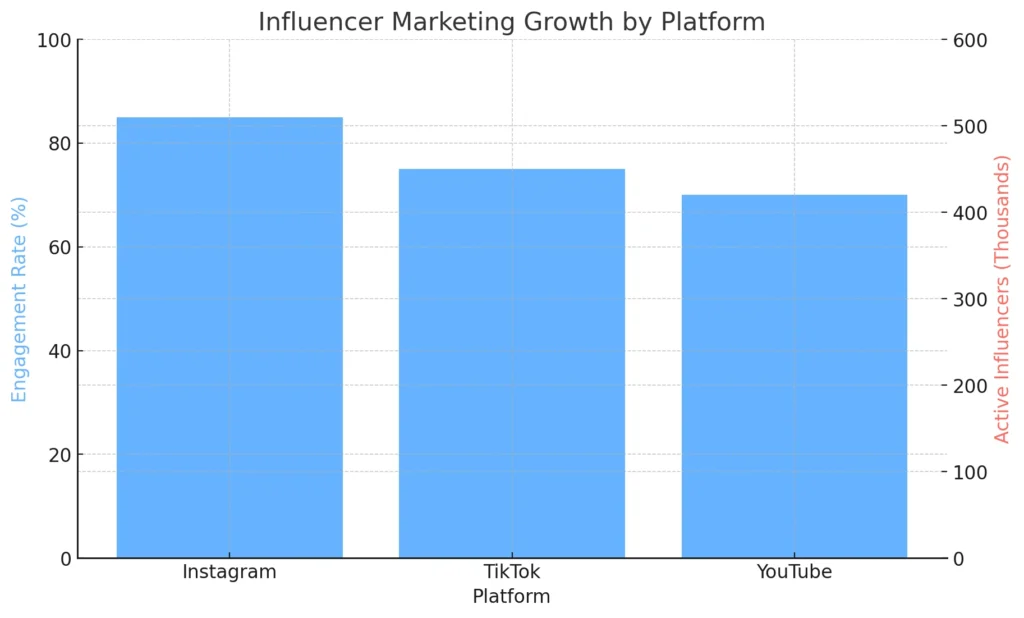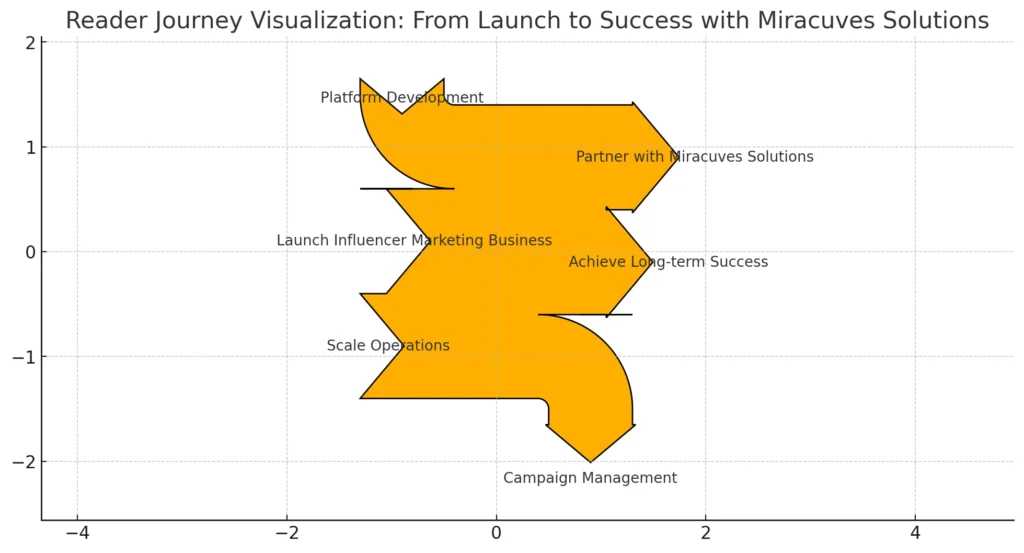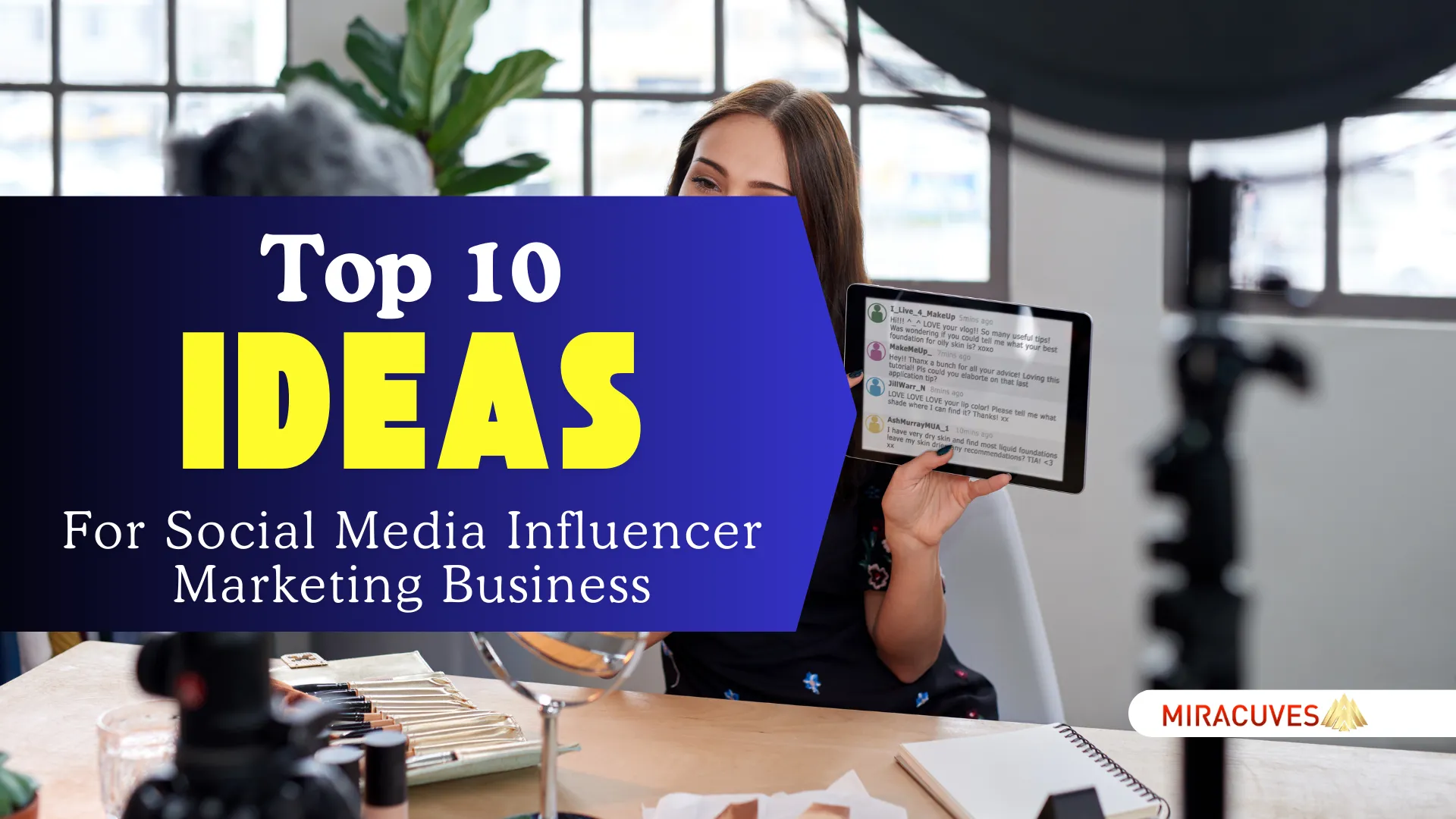In today’s digital world, social media has transformed from a place to connect with friends into a powerful platform for brand influence and business growth. One of the driving forces behind this shift is the rise of social media influencers—individuals with dedicated followings who have the ability to shape trends and consumer choices. This booming industry has opened the door for businesses specializing in influencer marketing, allowing brands to connect with audiences in authentic, impactful ways.
As brands increasingly recognize the value of influencers, the market for influencer marketing services continues to expand rapidly. With platforms like Instagram, YouTube, and TikTok attracting billions of users, influencer marketing has become one of the most effective methods to reach diverse demographics. Whether it’s launching a new product, building brand awareness, or driving sales, influencer partnerships are a key strategy for brands of all sizes.
For aspiring entrepreneurs, starting a business in this sector offers numerous opportunities to tap into one of the fastest-growing marketing fields. From creating influencer matchmaking platforms to offering campaign management and analytics services, there are countless paths to success in influencer marketing. This article explores the top 10 innovative business ideas that entrepreneurs can use to launch and grow a thriving social media influencer marketing business.
Why Choose Social Media Influencer Marketing?
Social media influencer marketing has quickly become one of the most effective ways for brands to connect with consumers on a personal level. Unlike traditional advertising, influencer marketing taps into the trust and loyalty influencers have built with their followers, creating authentic brand experiences. This personalized approach makes influencer marketing an invaluable tool for brands looking to engage with targeted audiences and build stronger connections.

1. High Engagement and Reach
Social media platforms like Instagram, TikTok, and YouTube have billions of active users, making them the perfect landscape for influencer marketing. With influencers engaging followers daily through posts, stories, and videos, brands have a unique opportunity to reach a wide audience that’s already interested in the influencer’s content.
2. Trust and Credibility
Influencers are seen as trustworthy sources by their followers. When an influencer endorses a product, it feels more like a recommendation from a friend than a traditional advertisement. This credibility enhances brand trust, helping companies build authentic relationships with their customers.
3. Cost-Effective Marketing
Compared to other forms of advertising, influencer marketing can be highly cost-effective, especially when working with micro and nano-influencers. These influencers often have smaller, highly engaged audiences, allowing brands to achieve meaningful results without a large budget. This cost-efficiency opens the door for businesses of all sizes to benefit from influencer partnerships.
4. Diverse Audience Targeting
With influencers spanning various niches—from fashion and beauty to fitness and technology—brands can target specific demographics with ease. Influencer marketing allows businesses to connect with the right audience, ensuring that their message reaches consumers who are genuinely interested in their products or services.
5. Future Growth and Scalability
Influencer marketing is not a passing trend; it continues to evolve and expand. With new tools for tracking engagement, analyzing data, and measuring campaign success, this industry has the potential for scalable growth. Businesses that invest in influencer marketing now are positioning themselves at the forefront of modern advertising, ready to evolve with emerging social media trends.
Also read How to Market a Social Networking and Community Platform Successfully After Launch
Current Trends and Future Opportunities in Influencer Marketing
The influencer marketing industry is evolving at a rapid pace, driven by shifts in consumer behavior, technological advancements, and changing brand strategies. For businesses looking to enter this field, understanding the current trends and future opportunities can provide a roadmap for success.
| Influencer Type | Follower Range | Engagement Rate | Best For |
|---|---|---|---|
| Nano-Influencers | 1,000 – 10,000 | Very High | Local or niche audience |
| Micro-Influencers | 10,000 – 100,000 | High | Targeted niche markets |
| Macro-Influencers | 100,000 – 1 million | Moderate | Wider audience reach |
| Mega/Celebrity Influencers | Over 1 million | Moderate to Low | Large-scale brand awareness |
1. Rise of Micro and Nano-Influencers
Micro and nano-influencers are gaining popularity as brands focus on more authentic, intimate connections with audiences. Unlike celebrity influencers, these smaller influencers engage with niche audiences who trust their opinions. This trend allows brands to connect with highly engaged followers on a budget, making it an appealing strategy for businesses with limited resources.
2. Focus on Authenticity and Transparency
Today’s consumers value authenticity more than ever. Influencers who maintain a genuine voice and only endorse products they believe in tend to attract higher engagement rates. This push for transparency has led to a decline in scripted posts, with influencers now sharing more behind-the-scenes content and honest reviews.
3. Data-Driven Campaigns and Performance Metrics
With more advanced analytics tools, brands and influencer marketers can track and measure the success of campaigns with precision. From engagement rates to sales conversions, data-driven insights allow businesses to optimize strategies and make informed decisions. This shift towards analytics-based marketing is creating opportunities for specialized businesses offering campaign tracking and reporting services.
4. Growth of Video Content
Video content has become a dominant format, especially on platforms like TikTok, Instagram Reels, and YouTube. Influencers use videos to create tutorials, product reviews, and lifestyle vlogs, making this format ideal for brands looking to showcase their products in action. For startups, offering video production and editing services can add tremendous value to influencer campaigns.
5. Expansion into New Platforms and Formats
While Instagram and YouTube remain popular, new platforms like TikTok are providing fresh ways for brands to reach younger audiences. Additionally, the popularity of live streaming has opened new doors for real-time engagement. Businesses that specialize in multi-platform strategies or live-stream influencer events can help brands tap into these emerging formats.
With more advanced tools available, brands and marketers now rely on data-driven insights to understand campaign effectiveness. By analyzing metrics such as engagement rates and conversions, influencer marketing campaigns can be optimized to better connect with target audiences, leading to stronger results and more strategic decision-making.
Top 10 Ideas for Social Media Influencer Marketing Business Startups
| Business Idea | Startup Cost Range | Target Market | Profit Potential |
|---|---|---|---|
| Influencer Matchmaking Platform | Medium to High | Brands across industries | High |
| Campaign Management Services | Low to Medium | Small to mid-sized brands | Moderate to High |
| Micro-Influencer Agency | Low | Local businesses, startups | High |
| Content Creation Studio | Medium to High | Influencers and brands | High |
| Video Production and Editing Services | Medium | Influencers and agencies | High |
| Data Analytics and Reporting | Medium | Brands and agencies | Moderate to High |
| Influencer Training and Consulting | Low | Aspiring influencers | Moderate |
| Influencer Event Planning | High | Mid to large-sized brands | Very High |
| Merchandise Management | Medium to High | Influencers with large followings | High |
| Platform-Specific Strategy Consulting | Low to Medium | Influencers and brands | Moderate to High |
1. Influencer Matchmaking Platform
Create a platform that connects brands with the right influencers based on niche, audience demographics, and engagement levels. This business model fills a crucial need for brands seeking authentic partnerships with influencers who align with their values.
- Target Market: Brands across all industries
- Estimated Costs: Medium to High (Platform development and database)
2. Campaign Management Services
Offer end-to-end management of influencer campaigns, from strategy development to content scheduling and reporting. This service appeals to brands that want to focus on their core business while outsourcing their influencer marketing efforts.
- Target Market: Small to mid-sized brands
- Estimated Costs: Low to Medium (Software tools and personnel)
3. Micro-Influencer Agency
Specialize in micro-influencer campaigns for brands targeting niche audiences. Micro-influencers have dedicated followers with high engagement, making them cost-effective yet impactful.
- Target Market: Local businesses, startups, and niche brands
- Estimated Costs: Low (Marketing and influencer outreach)
4. Influencer Content Creation Studio
Establish a content creation studio for influencers to produce high-quality photos, videos, and graphics. This service helps influencers create visually appealing content that attracts both followers and brands.
- Target Market: Influencers and brands in need of professional content
- Estimated Costs: Medium to High (Studio setup and equipment)
5. Video Production and Editing Services
Specialize in video production and editing, tailored to platforms like TikTok, Instagram Reels, and YouTube. With the rise of video content, this service is invaluable for brands looking to stand out.
- Target Market: Influencers, brands, and agencies
- Estimated Costs: Medium (Video equipment and editing software)
6. Data Analytics and Reporting Services
Provide in-depth analytics for influencer campaigns, tracking engagement rates, conversions, and ROI. Data-driven insights enable brands to optimize their influencer strategies effectively.
- Target Market: Brands and agencies wanting measurable results
- Estimated Costs: Medium (Analytics software and data expertise)
7. Influencer Training and Consulting
Offer consulting and training for influencers to help them build their brand, negotiate partnerships, and grow their following. This service is ideal for new influencers looking to build a professional career.
- Target Market: New and aspiring influencers
- Estimated Costs: Low (Workshop materials and online resources)
8. Influencer Event Planning
Organize influencer events, such as product launches and brand collaborations, that allow influencers to connect with brands in person. This service enhances brand-influencer relationships through memorable, live experiences.
- Target Market: Mid to large-sized brands and influencer agencies
- Estimated Costs: High (Event planning resources and venue costs)
9. Influencer Merchandise Management
Help influencers design, produce, and sell branded merchandise. This business model caters to influencers looking to diversify their revenue streams and create a stronger brand identity.
- Target Market: Influencers with large followings
- Estimated Costs: Medium to High (Merchandise production and logistics)
10. Platform-Specific Strategy Consulting
Offer specialized consulting for individual platforms, helping influencers and brands optimize their strategies on TikTok, Instagram, YouTube, etc. This service provides customized guidance for maximum platform engagement.
- Target Market: Influencers and brands targeting specific platforms
- Estimated Costs: Low to Medium (Platform knowledge and analysis tools)
Real-World Examples
| Business Model | Success Rate (%) | Common Challenges |
|---|---|---|
| Influencer Matchmaking Platform | 85% | Finding suitable influencer-brand matches |
| Micro-Influencer Agency | 80% | Managing multiple local campaigns |
| Data Analytics and Reporting | 78% | Ensuring accurate tracking and reporting |
| Influencer Event Planning | 75% | Coordinating with influencers and venues |
| Merchandise Management | 82% | Handling production and shipping logistics |
The social media influencer marketing industry is packed with success stories that highlight the power of creativity and strategic partnerships. Many influencer marketing businesses have carved out unique niches and built loyal client bases by offering innovative solutions tailored to brand needs.
One inspiring example is an influencer matchmaking platform that uses advanced algorithms to pair brands with influencers based on audience fit, engagement rates, and brand alignment. This targeted approach has helped companies achieve higher engagement, proving that matching the right influencer with the right brand creates a winning formula for impactful campaigns.
Another success story comes from micro-influencer agencies focused on local businesses. These agencies recognize that smaller influencers can deliver high engagement within specific geographic areas or niche markets. By working closely with local influencers, these agencies help businesses connect with their communities, driving foot traffic and sales effectively.
Data analytics and reporting services have also thrived, as brands increasingly seek to measure the ROI of their campaigns. By providing detailed reports on engagement rates, conversions, and overall campaign performance, analytics services empower brands to refine their strategies and achieve better results over time. This focus on measurable outcomes has made data-driven agencies invaluable partners for brands looking to make informed marketing decisions.
Another standout example is influencer event planning, where agencies organize product launches, brand meet-and-greets, and exclusive events for influencers. These events create immersive brand experiences, allowing influencers to engage deeply with the product and share authentic, real-time content with their audiences. This approach not only strengthens brand-influencer relationships but also generates high-quality content that resonates with followers.
Lastly, merchandise management services have emerged as a popular business model, enabling influencers to expand their income by selling branded merchandise. From designing products to handling logistics, these agencies help influencers launch successful product lines, strengthening their brand and providing fans with a tangible way to connect with their favorite creators.
Mistakes to Avoid When Starting an Influencer Marketing Business
Starting an influencer marketing business can be a rewarding journey, but like any industry, there are pitfalls to watch out for. Being aware of common mistakes can help you build a strong foundation and provide high-quality services that clients trust and value.
| Mistake | Impact | Preventive Solution |
|---|---|---|
| Lack of Clear Goals and Metrics | Hard to measure success | Set specific objectives and KPIs |
| Poor Influencer Selection | Low engagement and brand disconnect | Choose influencers based on engagement and relevance |
| Inadequate Contract Management | Misunderstandings and unmet expectations | Use detailed contracts for all partnerships |
| Overlooking Compliance and Transparency | Fines and reputation damage | Ensure proper disclosure of partnerships |
| Ignoring Post-Campaign Analysis | Missed insights for future improvements | Regularly review data and adjust strategies |
1. Lack of Clear Goals and Metrics
One of the biggest mistakes in influencer marketing is not establishing clear goals and measurable metrics for campaigns. Without specific targets, such as engagement rates or conversion numbers, it’s difficult to assess a campaign’s success. Setting clear objectives and KPIs (Key Performance Indicators) ensures both the influencer and brand know what they’re aiming for, allowing for better evaluation and optimization.
2. Poor Influencer Selection
Choosing influencers based solely on their follower count, without analyzing engagement rates or audience demographics, can lead to poor campaign results. An influencer might have a large following but lack the engagement or relevance needed for a brand’s goals. Always prioritize influencers who resonate with the target audience and align with the brand’s values, as these factors typically lead to more meaningful interactions and conversions.
3. Inadequate Contract and Terms Management
Influencer partnerships without well-defined contracts can lead to misunderstandings and unmet expectations. Contracts should outline deliverables, timelines, payment terms, and content usage rights to protect both the business and the influencer. This helps ensure that each party knows their responsibilities, reducing the chance of disputes.
4. Overlooking Compliance and Transparency
Regulations require influencers to disclose paid partnerships, but ignoring these guidelines can result in fines and damage to both the influencer’s and the brand’s reputation. Ensuring that all sponsored content is clearly labeled as such builds trust with audiences and keeps campaigns compliant with industry standards.
5. Ignoring Data and Post-Campaign Analysis
A successful influencer marketing business relies on data. Neglecting to analyze a campaign’s performance means missing valuable insights that could improve future strategies. Reviewing engagement metrics, conversion rates, and audience feedback after each campaign provides the information needed to refine and enhance future influencer partnerships.
Maintaining compliance with advertising guidelines is crucial in influencer marketing. Sponsored content must be clearly disclosed to avoid fines and ensure transparency with audiences. Following these regulations not only builds trust with consumers but also helps avoid legal complications, creating a more authentic influencer marketing approach.
Why Trust Miracuves Solutions for Your Next Project?
Starting a successful influencer marketing business requires more than creativity; it requires a powerful technology platform to manage campaigns, analyze data, and connect brands with the right influencers. This is where Miracuves Solutions comes in as a trusted partner, offering tailored software and technology solutions to support and elevate your business.
1. Customizable Platform for Influencer and Brand Connections
Miracuves Solutions provides customizable platforms that make it easy to match brands with the right influencers. With advanced search tools, you can filter influencers based on engagement rates, audience demographics, and content style. This customization ensures that brands connect with influencers who resonate with their target audience, resulting in more effective campaigns.
2. Advanced Analytics and Campaign Tracking
Data is at the heart of every successful influencer marketing campaign. Miracuves Solutions offers analytics tools that allow you to track engagement rates, conversions, and other key performance indicators in real-time. This data-driven approach enables you to measure success accurately, make informed adjustments, and provide your clients with detailed campaign reports that build trust.
3. Scalable Solutions for Growing Businesses
As your influencer marketing business grows, you need a platform that scales effortlessly. Miracuves Solutions is designed to support businesses of all sizes, making it easy to expand services without the need for a costly tech overhaul. From managing multiple campaigns to accommodating a larger client base, Miracuves provides scalable solutions that grow alongside your business.
4. Ongoing Support and Up-to-Date Technology
The social media landscape changes quickly, and staying up-to-date is crucial. Miracuves Solutions provides continuous support and regularly updates its platform to incorporate new features and align with the latest trends in influencer marketing. This ensures that your business always operates at the cutting edge, providing clients with the best tools available.

Conclusion
The world of influencer marketing offers immense opportunities for entrepreneurs to create impactful and profitable businesses. As social media platforms continue to evolve and consumer trust in influencer recommendations grows, the demand for specialized services in influencer marketing shows no signs of slowing down. Whether you’re launching a matchmaking platform, offering campaign management, or creating an analytics-focused service, each idea has the potential to bring value to brands seeking meaningful engagement with their audiences.
Establishing a successful influencer marketing business involves a strategic approach, combining technology, creativity, and strong client relationships. By staying ahead of trends like micro-influencer partnerships, data-driven campaigns, and video content, your business can offer unique services that set you apart in the competitive influencer marketing space.
The journey may be challenging, but with the right tools, dedicated partnerships, and a focus on delivering authentic connections, the path to building a thriving influencer marketing business is well within reach. Now is the perfect time to dive into this dynamic industry, connect brands with audiences, and make a lasting impact in the world of social media.
FAQs
How much does it cost to start an influencer marketing business?
Startup costs vary depending on the services offered. A matchmaking platform may require $10,000 or more in development costs, while campaign management or consulting can start as low as $2,000 with basic tools and resources.
What are the primary services offered in an influencer marketing business?
Services range from influencer matchmaking and campaign management to content creation, analytics, event planning, and merchandise management. Each service addresses specific needs within the influencer ecosystem, allowing businesses to specialize or diversify.
How can I find influencers for my campaigns?
Building a network of influencers begins with researching relevant niches on social media platforms, engaging with influencer communities, and using platforms that connect brands with influencers based on audience demographics and interests.
What are the biggest challenges in influencer marketing?
Common challenges include finding influencers who align with brand values, managing campaign timelines, and measuring ROI accurately. Building a structured approach to vetting influencers and using data analytics can help overcome these hurdles.
How can I measure the success of influencer campaigns?
Key performance indicators (KPIs) such as engagement rate, click-through rate, conversions, and ROI are commonly used. Regularly reviewing these metrics provides valuable insights for refining future campaigns.
Related Article: –








